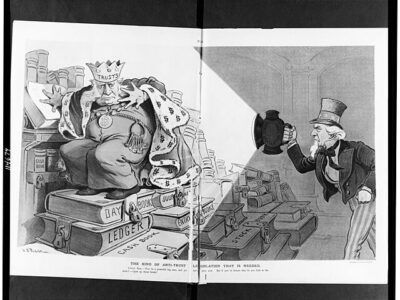Violations of Free Speech at EPA
EPA employees were within their rights with the dissent letter they wrote.
After firing a few others, EPA recently announced mass suspensions for employees who signed a dissent letter to Zeldin (cc’d to Congress), protesting EPA’s anti-environmental policies. The discipline violates the First Amendment and quite likely the Whistleblower Act. It is part of a series of efforts to quash independent thought among civil servants: It is not enough for their actions to support administrative policies; so must their thoughts.
The dissent letter is strongly worded but within the bounds of civility. Here are the headline criticisms of the agency (in bold type in the dissent letter), with a brief comment on each:
“Undermining public trust.” The specifics largely relate to use of EPA communications for partisan ideological purposes like promoting Trump’s tariffs or calling climate science a religion.
“Ignoring scientific consensus to benefit polluters.” Two words here: “endangerment finding.”
“Reversing EPA’s progress in America’s most vulnerable communities. Eliminating environmental justice programs isn’t exactly likely to decrease pollution in those communities, whatever else you might say for it.
“Dismantling the Office of Research and Development.” This is an official act, so indisputable.
“Promoting a culture of fear, forcing staff to choose between their livelihood and well-being.” The suspension of dissenting employees only serves to confirm that.
Although some signatories identified their positions at EPA, the dissent letter is explicit that the signatories are speaking “in our personal capacity, on our own time, and without Agency resources.”
EPA says that the letter is “Conduct Unbecoming of a Federal Employee,” and that it is disruptive to the workforce, has a negative effect on the agency’s reputation, and is distracting the agency from its mission. More specifically, EPA says, “while the entirety of the Declaration is inflammatory, the phrases identified in the specifications above provoke strong reactions as they accuse the administration of compromising important programs and endangering public health and/or scientific integrity.” A bit ironic, really, considering the kind of inflammatory language that Trump and his underlings customarily use.
At bottom, this isn’t a complaint about language; it’s a complaint that the letter makes serious charges.
This is all reminiscent of a major Supreme Court case. EPA’s explanation is remarkably like the charge that a school board made against a teacher for harshly criticizing the board. According to the school board, “the false statements damaged the professional reputations of its members and of the school administrators, would be disruptive of faculty discipline, and would tend to foment ‘controversy, conflict and dissension’ among teachers, administrators, the Board of Education, and the residents of the district.” This might have been written by the same person who wrote EPA’s charges against its own employees.
The Supreme Court held that punishing the teacher violated the First Amendment. Rather than saying that teachers have no right to publicly call out their superiors, the Supreme Court emphasized that they are uniquely able to contribute to public debate about school policy. Just so here: Who better than EPA employees to inform the public about the state of affairs at EPA?
The Whistleblower law also seems, on the face of things, to protect the EPA workers. It forbids discrimination against an employee who discloses information that the employee “reasonably believes” reflects serious agency failures, including violations of law, gross mismanagement, abuse of authority, or a “substantial and specific danger to public health or safety.” Employees have to surmount what has been called a “procedural obstacle course,” but they do have ultimate recourse to court.
I know it must be a shock to the Trump Administration that even lowly civil servants — I’m sure they would put the emphasis on “servants” — have rights that Important People like them are obliged to respect. But we still live in a democracy, and as the Supreme Court once said, government employees don’t leave their First Amendment rights at the door.
Reader Comments
One Reply to “Violations of Free Speech at EPA”
Comments are closed.







The letter states eloquently why the EPA employees cannot be fired for supporting truth. This administration operates outside the law routinely and will again be restrained by the Supreme Court.